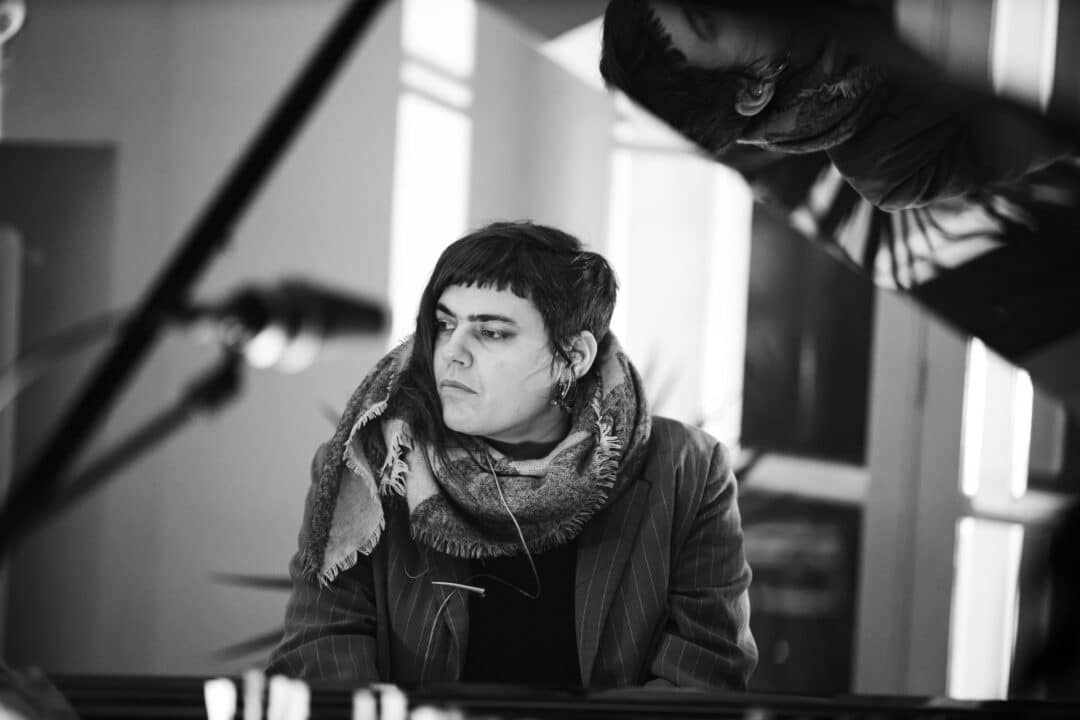
In this series, mica – music austria and Austrian Music Export have collected the experiences and perspectives of women in the music business. No matter the categories, quotas or breakdowns, the goal is 100% of us working together in the struggle for feminism. Ingrid Schmoliner is a pianist, composer, and educator; her work focuses on contemporary classical and improvised music. She is co-founder of the contemporary music festival “New Adits”, now in its twelfth year.
What people / institutions / funding programs helped you along the way in the music business?
Ingrid Schmoliner: I learned a lot with the help of mica – music austria. From the Federal Ministry of Culture and the MA7 [City of Vienna cultural department] you can get information on individual calls for proposals and support structures. Partially, too, it was other musicians who fortunately allowed me to look at their successful grant applications.
“I have to be very clear here: if the subvention situation doesn’t improve, self-exploitation will remain a huge issue.”
How and where did you get your experience in the music business?
Ingrid Schmoliner: I think the only thing that really helps is to simply start doing things and gather experience. If you’re serious about music as a profession, you’ll make progress. Obviously, I had to lose my rose-colored glasses –you have to constantly invest time and energy in your goal, and they often won’t be repaid.
You also need capital to invest in a “marketable product”. I have to be very clear here: if the subvention situation doesn’t improve, self-exploitation will remain a huge issue. It seems that working innovatively is reserved for the upper middle classes, or else you decide to accept phases of living very precariously – or a state of constant overwork and burnout. This process was what led me to work with the think tank “mitderstadtreden” for about two years. Even before COVID, the precarity for us freelancers in innovative, contemporary music.
What were your biggest challenges, and how did you overcome them?
Ingrid Schmoliner: The biggest challenge was the lack of financial resources; the fact that we artists have to cover our own fixed costs still gets far too little attention. Without fixed employment, we have no safety net whatsoever when we get sick, and we’re unfortunately a long way from being able to afford supplementary insurance – like worker’s compensation insurance, for example.
I was never able to save any money for an emergency. And you need money for infrastructural costs as well – there is a huge lack of affordable rehearsal spaces with good pianos and other instruments.
This patchwork subvention structure leads to many hours of additional administrative work – and for large projects that an individual artist might want to realize, it leads to repeated self-exploitation. The grants are often much too small, and you have to found a Verein [association] to be able to apply for larger ones.
And then – particularly in the music branch – there are far too few production companies able to help organize projects, especially on a smaller scale. Even if they did exist, you could never pay them with the grant money available. Most of all, there’s a lack of people in our branch who can see the value of these things – in contemporary and experimental music, in jazz, and in electronic music – people who can take over management and booking, or start small agencies to represent our scene, sufficiently and at the international level.
“A holistic, cosmopolitan, comprehensive cultural policy is a huge help.”
What kind of support have you received in your career?
Ingrid Schmoliner: The thing that has helped the most is money to pay my bills and allow me to work. In my case, it was awards, a START stipend, a state stipend, composition grants, grants for projects, for production and travel costs, the SKE, the Österreichische Musikfonds (Austrian Music Fund) and the German Music Fund.
Promoters who believe in the quality of my work and repeatedly invite me to play.
mica – music austria helps!
An open discourse in our own scene that leads to more strength, solidarity, and consciousness, and brings our issues and problems to politicians and negotiates.
A holistic, cosmopolitan, comprehensive cultural policy is a huge help.

Where would you have liked (more) support?
Ingrid Schmoliner: I (still) wish there were infrastructural support for the freelance music scene. Rehearsal spaces that are affordable, or – like in Berlin – organized by an association and can be booked for very little money. Naturally with instruments like grand pianos, percussion, etc.
I wish there was more support for booking, social media, and grant applications; I have far too little time to really work as an artist. Public relations not just aimed at the mainstream. Radio programs with space for diverse, innovative music – also during the day – and offer consumers a ready introduction to, and impression of, the diversity of the Austrian music scene.
“As an artist and a private person, I’m interested in authenticity, compassion, innovation and depth – that’s what I live, and hopefully what I pass on.”
Did you have role models around you to look up to?
Ingrid Schmoliner: I had colleagues who helped me by sharing their experiences and allowing me to look at their grant applications. In a way, all the artists who have managed to bring innovative work to international stages despite difficult circumstances are role models to me. So are people who act authentically, have an opinion that isn’t carved in stone, who are prepared for a discussion. People who are prepared to see the bigger picture. People who have been able to sustain their curiosity, lust for life, and compassion, although they only control a small portion of their lives.
What role models do women in the music business have right now?
Ingrid Schmoliner: Women who speak truth about the realities of their lives, who don’t become bitter. We still exist in a very male-dominated world, and that makes it much more difficult to point out inequalities. Everyone talks about freedom of opinion, but the existing imbalance has a censoring effect. That’s just part of it.
What can you pass on to others?
Ingrid Schmoliner: As an artist and a private person, I’m interested in authenticity, compassion, innovation, and depth – that’s what I live, and hopefully what I pass on.
“Unfortunately, the social media hype for stereotypes just keeps increasing…”
What role does age play for you?
Ingrid Schmoliner: To me, age means life experience, artistic quality, and honing one’s work. Age is a magnifying glass. But unfortunately, it has a special meaning for women. Promoters love to advertise with young, attractive people. When a woman is between 40 and 60, she may not get booked any more, just because “innovation” is often equated with youth, especially in electronic music. To me, though, innovation is connected with precision, depth, and experience. Unfortunately, the social media hype for stereotypes just keeps increasing – good-looking, artificial profiles, often androgynous and sexualized, good at provoking people. Sex sells, and youth sells – in the arts as well.
What would you like to see in terms of a more diverse music scene?
Ingrid Schmoliner: More solidarity, networking, and most of all more stages (with a piano) for contemporary music in Vienna and Austria, that are able and willing to pay fees adequate to the total infrastructure and for the artists. Public relations that represent more than the mainstream, and more programming space for these areas on public radio (as mentioned above).
“When a woman receives a grant or an award, there’s often the bitter aftertaste that she ‘only’ got it because she’s a woman – and there’s the quota issue again.”
What questions do you get asked that a man would never be asked?
Ingrid Schmoliner: It’s less about questions than about certain realizations in discourse: one time a male colleague told me that women don’t have to work or function as well as men in order to be invited to perform, since there’s less competition and promoters have to fulfill their female quotas. When a woman receives a grant or an award, there’s often the bitter aftertaste that she “only” got it because she’s a woman – and there’s the quota issue again.
The issue of family planning. It’s much easier for a father to stay in the business as an artist and not be written off. There’s a huge lack of resources for female artists who want to become mothers, especially if they don’t come from a better social milieu or have recourse to an inheritance during this difficult phase.
That’s why I had to make the decision not to have a child, and not to want one anymore.
Link
Translated from the German original by Philip Yaeger.
